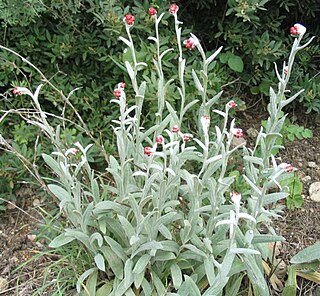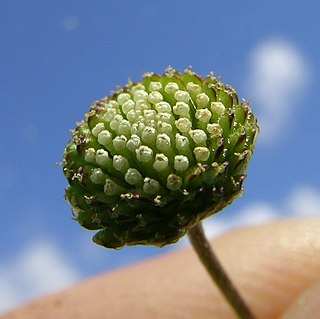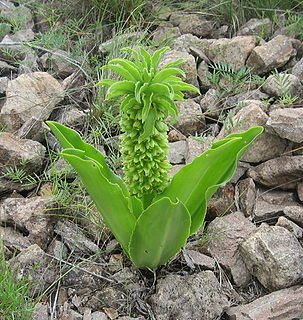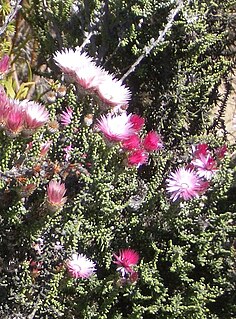
Asterales is an order of dicotyledonous flowering plants that includes the large family Asteraceae known for composite flowers made of florets, and ten families related to the Asteraceae. While asterids in general are characterized by fused petals, composite flowers consisting of many florets create the false appearance of separate petals.

The genus Helichrysum consists of an estimated 600 species of flowering plants in the sunflower family (Asteraceae). The type species is Helichrysum orientale. They often go by the names everlasting, immortelle, and strawflower. The name is derived from the Greek words ἑλίσσω and χρῡσός.

Lycopodium clavatum is the most widespread species in the genus Lycopodium in the clubmoss family.

The Gnaphalieae are a tribe of flowering plants in the family Asteraceae. It is most closely related to the tribes Anthemideae, Astereae, and Calenduleae.

Cotula australis is a species of plant in the daisy family known by the common names bachelor's buttons, annual buttonweed, southern waterbuttons and Australian waterbuttons. This small plant is native to Australia and New Zealand, but it is known in other areas of the world as a common weed.

Eucomis is a genus of flowering plants in the family Asparagaceae, subfamily Scilloideae, native to southern Africa. Most species of this genus are commonly referred to as pineapple flowers or pineapple lilies. They are bulbous perennials with basal rosettes of leaves and stout stems covered in star-shaped flowers with a tuft of green bracts at the top, superficially resembling a pineapple – hence the common names.

Phaenocoma is a genus of South African plants in the tribe Gnaphalieae within the family Asteraceae. The name is derived from the Greek roots φαίνω and κόμη (hair), which refer to dry and shiny involucral bracts.
Anisothrix is a genus of flowering plants in the daisy family, Asteraceae.
Hydroidea is a genus of flowering plants in the family Asteraceae.
Lachnospermum, common name rooiblombos, is a genus of South African flowering plants in the family Asteraceae.
Lepidostephium is a genus of South African flowering plants in the family Asteraceae.
Petalacte is a genus of flowering plants in the family Asteraceae.
Tenrhynea is a genus of Southern African plants in the tribe Gnaphalieae within the family Asteraceae.

Vellereophyton is a genus of flowering plants in the family Asteraceae.

Dymondia is a genus of flowering plants in the daisy family. There is only one known species, Dymondia margaretae, endemic to the Cape Province region of South Africa.
Marasmodes is a genus of South African shrubs in the chamomile tribe within the daisy family.

Oncosiphon is a small genus of flowering plants in the daisy family (Asteraceae). All known species are native to southern Africa.
Capelio is a genus of flowering plant in the Asteraceae first described as a genus in 1836 with the name Alciope. It was renamed Capelio in 2002 after it was determined that the name Alciope was not legitimately published according to international nomenclatural rules. Capelio is a taxonomic anagram derived from the former name Alciope.
Adenanthellum is a genus of flowering plants in the daisy family, Asteraceae described as a genus in 1979.









